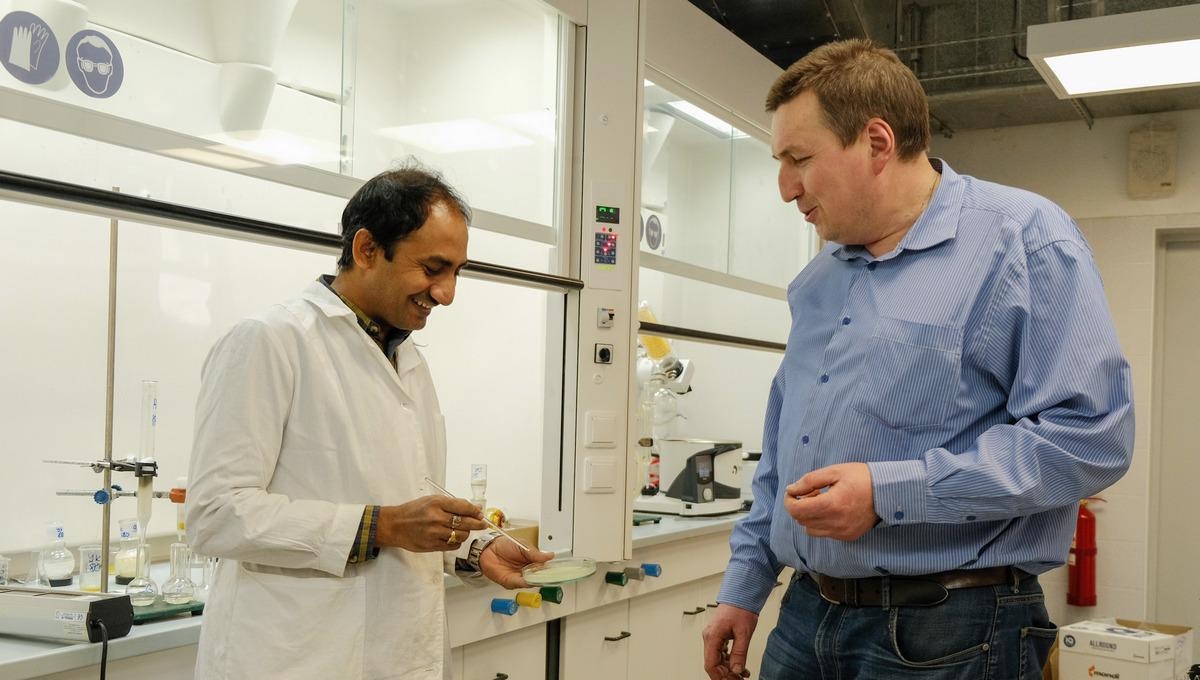Mar 24 2021
An international team of researchers from India and Russia has developed edible food films for packaging vegetables, fruits, seafood, meat, and poultry. The new films are made of natural ingredients and are safe for the environment and health.
 Rammohan Aluru (left) and Grigory Zyryanov (right), as part of a team of chemists, created edible algae-based food films (in a Petri dish). Image Credit: Andrey Fomin.
Rammohan Aluru (left) and Grigory Zyryanov (right), as part of a team of chemists, created edible algae-based food films (in a Petri dish). Image Credit: Andrey Fomin.
The newly developed films dissolve in water by nearly 90% within 24 hours. The study and experiment results have been published in the Journal of Food Engineering.
“We have created three types of food films based on the well-known naturally occurring seaweed biopolymer sodium alginate,” stated Rammohan Aluru, co-author of the study and senior researcher in Organic Synthesis Laboratory at Ural Federal University.
Its molecules have film-forming properties. Sodium alginate is an auspicious carbohydrate macromolecule that has the potential film-forming properties upon hydrolysis and abundantly existed in cell walls as a mixture of various salts. The greatest advantage of sodium alginate is that it performs as liquid-gel in an aqueous medium.
Rammohan Aluru, Study Co-Author and Senior Researcher, Organic Synthesis Laboratory, Ural Federal University
The researchers cross-linked alginate molecules with a natural antioxidant ferulic acid. This makes the film sturdy and more rigid, homogeneous and extends the shelf-life of products.
Food stays fresh longer due to the antioxidant components that slow down the oxidation processes. In addition, we can add to the films natural antiviral agents, that will also extend the shelf life of food. Garlic, turmeric, and ginger contain compounds that may prevent the spread of the viruses.
Grigory Zyryanov, Professor, Department of Organic and Biomolecular Chemistry, Ural Federal University
The researchers reported that the production of the new films did not require any special equipment. On an industrial level, it can be manufactured by food products and film manufacturers.
It can also be produced at a polymer production plant. The only condition is that it must meet the standards that apply to food production. And if an inexhaustible source of algae the ocean is nearby it will be quite simple to create such films.
Grigory Zyryanov, Professor, Department of Organic and Biomolecular Chemistry, Ural Federal University
Researchers from the Sri Venkateswara and Sri Padmavati Mahila Viswavidyalayam Universities (Tirupati, India), Ural Federal University, and Ural Branch of the RAS (Ekaterinburg, Russia) were involved in the development of the films.
The study was financially supported by the University Grants Commission (New Delhi, India, Rajiv Gandhi National Scholarship F1-17.1 / 2016-17 / RGNF-2015-17-SC -AND-18494 / SAIII), and the Central Institute of Plastics Engineering and Technology (Vijayawada, India).
Sodium alginate is a well-known, natural edible biopolymer that finds use as a stabilizer (food additive E401) and thickener. It is also used as a stabilizer or thickener. Ferulic acid—a derivative of cinnamic acid—exhibits an extensive range of pharmacological properties, specifically, antitumor, anti-inflammatory, hepato- and cardioprotective, antitoxic, antibacterial, and antiviral. This is chiefly because of the antioxidant properties of this acid.
Journal Reference:
Yerramathi, B. B., et al. (2021) Structural studies and bioactivity of sodium alginate edible films fabricated through ferulic acid crosslinking mechanism. Journal of Food Engineering. doi.org/10.1016/j.jfoodeng.2021.110566.